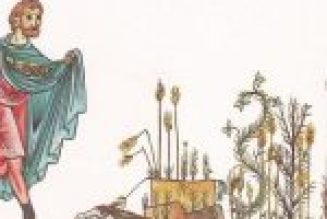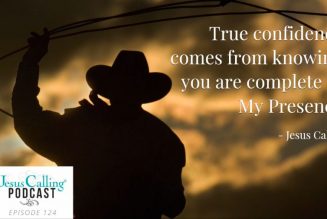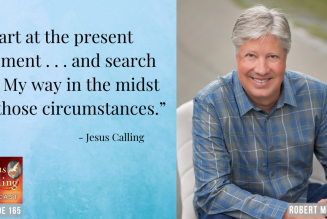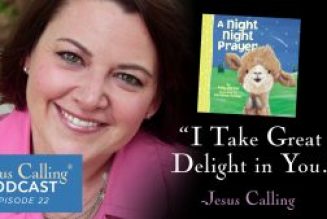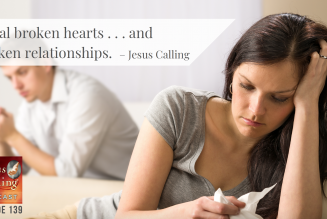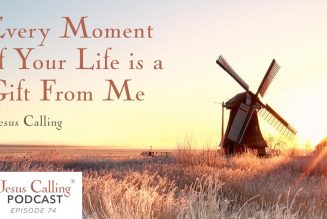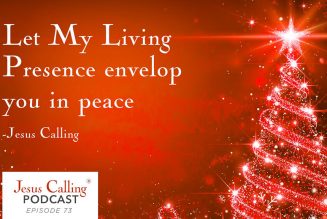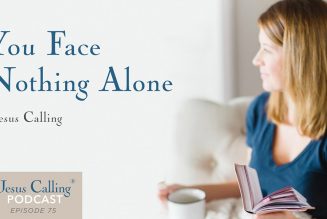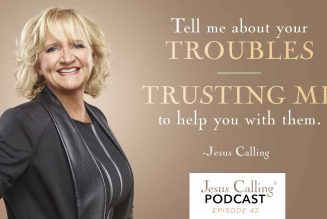Bo Stern and Justine Froelker have walked dark roads filled with grief and lost hope. Today, Bo and Justine share how God gave them strength during and in the aftermath of their personal heartaches, especially at the holidays. Author and pastor Bo Stern had a happy home filled with four children, lots of friends and a loving church family. After two decades of marriage, her husband Steve’s health gradually began to deteriorate, and they came to learn he was battling the first signs of ALS. In her book When Holidays Hurt, Bo recalls how painful and disorienting the Christmas season was during Steve’s illness, and how she wrestled with how to hold sadness and joy in her heart during the holidays. As therapist and author Justine Froelker has grown closer to God and studied with shame and vulnerability researcher Dr. Brené Brown, she has learned how to share her painful journey so she can help others. One of Justine’s most painful battles has been her struggle with infertility, all the while witnessing her friends’ growing families. In an unlikely encounter with God on Christmas Eve, Justine realized He had been with her during every painful step of her journey, and He had great plans for her, though they might look different than Justine’s own plan for her life.
SPONSORSHIP ANNOUNCEMENT
This episode of the Jesus Calling Podcast is brought to you by James Avery Jewelry. Gifts for everyone on your Christmas list. JamesAvery.com.
This episode of the Jesus Calling Podcast is brought to you by James Avery Jewelry. Gifts for everyone on your Christmas list. JamesAveryJewelry.com.
Bo Stern: I think I am more connected now to the suffering Christ than I ever was before. And it helps me relate to suffering people in a way that’s compassionate instead of judgmental or corrective or prescriptive. “If only you could get yourself out of this thing.” And now I realize that God does His best work inside of our hardest moments. He was built for this. I was not. I think I was created for a garden, but He was built for battle, and He shows up in it.
When Holidays Hurt: Bo Stern and Justine Froelker– Episode #126
Narrator: Welcome to the Jesus Calling Podcast. Today’s guests are author and pastor Bo Stern and therapist Justine Froelker. In each of their lives, Bo and Justine have walked dark roads filled with grief and lost hope. As each traveled through a long season of sadness, they encountered loneliness, even when surrounded by joy and other people. Today, Bo and Justine tell us how God gave them the strength to face life during and in the aftermath of their personal heartaches. Up first is Bo Stern. Bo had a happy home filled with four children, lots of friends and a loving church family. After two decades of marriage, her husband Steve’s health gradually began to deteriorate and they came to learn he was battling the first signs of ALS. In her book When Holidays Hurt, Bo recalls how painful and disorienting the Christmas season was during Steve’s illness, and how she wrestled with the notion of how to hold sadness and joy in her heart during the holidays.
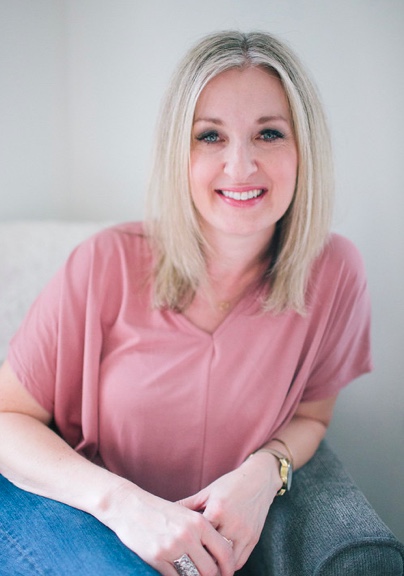 Bo Stern: My name is Bo Stern, and I am a pastor and author in Bend, Oregon, actually. And I wrote a book for those whose holidays are very difficult.
Bo Stern: My name is Bo Stern, and I am a pastor and author in Bend, Oregon, actually. And I wrote a book for those whose holidays are very difficult.
I am an Oregon girl, born and bred, and I’ve lived in Oregon most of my life. And my family were amazing—still are amazing. My parents are the most amazing people raised me loving and knowing Jesus and just built to follow Him and pursue Him. And then I met my husband in Bible college. And we got married in the ‘80s, and then we had four kids and made our home here in Bend. We had always wanted to live here and we ended up here and got jobs in our church here.
“As long as I kept out of trouble, things would go okay.”
My parents had a really lovely view of God, but also a stringent one in terms of “If you do things right, then He will bless you and He will take care of you.” It was kind of “try to be good and stay out of His way” idea. But I did have this close friendship with God. I remember being really little and knowing He was with me, and my parents did a great job teach me that.
But there also was a very strict “follow the rules: idea. Their background was Mennonite and pretty conservative, in terms of how you dress and what you say and what you do. And so I had an idea that if I saw people’s life hit really turbulent times, there probably was a reason why. There was probably something that they had done, and if they only had done something a little bit better, God would have been happier, or things would have gone better, or these are just natural consequences.
So I kind of had this secret belief system—I don’t know that it was even visible to myself—that as long as I did things okay and as long as I kept out of trouble, things would go okay for me and my family.
“I kind of had this secret belief system…that as long as I did things okay and as long as I kept out of trouble, things would go okay for me and my family.” – Bo Stern
Finding Out Things Are Not Okay
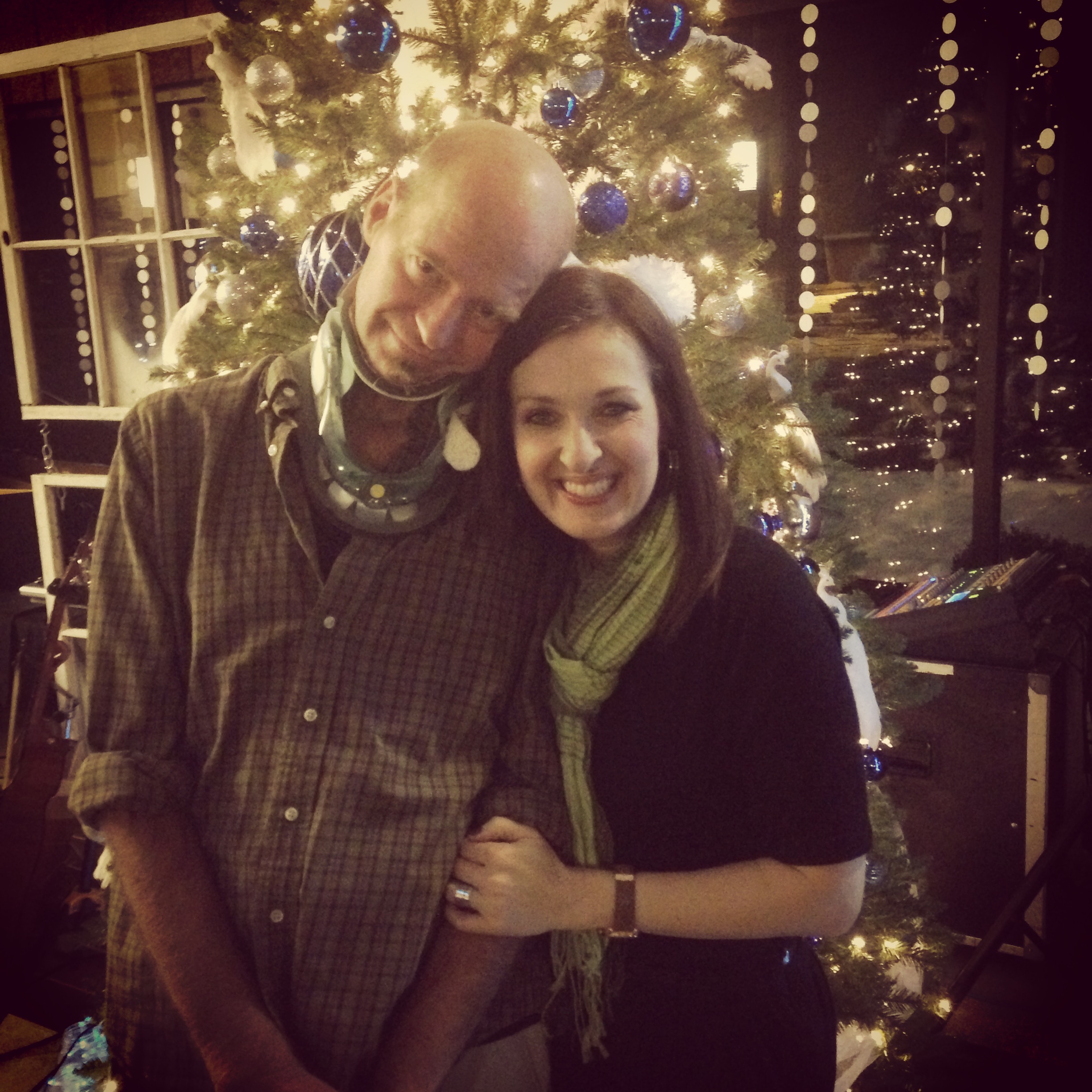 My husband was in sales most of his life, and then in ministry for about the last eight, ten years. He loved being in business and being able to take his relationship with God into a really hurting world.
My husband was in sales most of his life, and then in ministry for about the last eight, ten years. He loved being in business and being able to take his relationship with God into a really hurting world.
We both went to Portland Bible College, and we really hated each other—like, passionately disliked each other. He would disagree with me about that, I think, but I really felt strong a strong dislike for him. And then something changed in our relationship my second year there, and we very quickly fell in love. And it was that kind of that idea of like “hate isn’t the opposite of love like, disregard is the opposite.” So we had this strong passion, and we started dating and were gone. Like, we were gone in six weeks or so.
Then we got married about eight months later and settled into the church that was a part of our Bible college community. We had kind of our little community of people who had also gone to college with us and got married with us. And then we all had babies together, and it was really lovely.
We had been married 25 years. He was 48, and we had been married a while. He was losing weight—he had been working out a lot, and so I thought that was probably it. And then one day he came home and said, “My golf swing is 40 yards short. There is something off.” And not everyone can gauge their health by their golf swing, but my husband could.
We kind of started a process of going to doctors, and they misdiagnosed things a few times and came up with a rotator cuff injury. And it was just a lot of stuff. We’d think he was getting better and then you know it seemed like he wasn’t getting better. He had a really intense travel schedule, so he was tired a lot. It was just a lot of things of him just not being right.
We went to a neurologist in September of 2010. It was the first time he said the words, “I think this might be motor neuron disease.” And then it took five months. ALS is very difficult to diagnose. And there aren’t any tests that show you have it—just tests that eliminate everything else. So it took us another five months until he got the official diagnosis of ALS, or Lou Gehrig’s disease.
We have four kids at this point. Our youngest is 11. I remember the first day we sat on our couch, and we just cried together. We held hands, and we just said, “We are lashed to the altar of God’s purpose. We have given ourselves to the purpose of God. And so wherever that road takes us, we want to go there, and we want our kids to see that we’re able to walk difficult roads with joy.”
“We want our kids to see that we’re able to walk difficult roads with joy.” – Bo Stern
At that point, that was probably our biggest area of need was just feeling like, “What is going to happen to our kids watching their dad go through this process?” ALS is 100-percent fatal, and the process is very difficult as the person is paralyzed slowly until just their eyes and brain function. And so looking at that from the beginning of the road and trying to figure out what it would look like as we walked into it was really scary. And so our determination was just like, “God, we don’t know exactly where we’re going, and we’re going in blind. But this is what faith we’ll have. This is where faith is going to have to carry us.”
And then all of those things came up, but we did it as right as we knew how to do it. We paid our tithe and paid our dues and did all the right things, and still it feels like our ship is sailing into this stormy sea, and we can’t steer out of it. We had to determine at that point that we would know the love of God in that situation, even though it didn’t seem fair. It didn’t seem right. And it really started to jostle our theology and moved some pieces around in what I will say was a very good way. It was also very difficult. Nothing like a looming ALS diagnosis will set you on your spiritual feet and say, “You better get it together sister.”
“We paid our tithe and paid our dues and did all the right things, and still it feels like our ship is sailing into this stormy sea, and we can’t steer out of it.” – Bo Stern
We had people that were really certain Steve would be healed and really stuck their flag in that ground and really prayed and fought for that, and I appreciate it. But there was a moment where we had to say, “The will of God is going to be the will of God in this situation. And we are going to love Him in it.”
“The will of God is going to be the will of God in this situation. And we are going to love Him in it.” – Bo Stern
And we wanted our kids to see that that the love of God for our family was not tied to Steve’s physical outcome. That was a core value for us was this is getting moved around in our life, this idea that “If we do it right God will respond to us right.” And now we’re saying, “No. We are looking at the God who works all things together for His good and His glory and our good.” We really wanted our kids to see that God loved us, no matter what, and and to be certain and that our theology was set and we were serving Him, no matter what, and we knew it. And so we wanted them to know that God was in this, and He was in our suffering as much as He had ever been in our successes.
“We wanted our kids to see that that the love of God for our family was not tied to Steve’s physical outcome.” – Bo Stern
Paul said, “It’s through much suffering that we enter the kingdom,” and I do think that there is something about suffering that brings us closer to God. The centerpiece of our faith is Christ on the cross. Suffering stands at the middle of what we believe, and yet somehow, especially in America, we’ve created this idea that God’s mission in our life is primarily to lead us around it. And I think I don’t believe in that God any more.
Walking the Long, Painful Journey Through ALS
 Steve’s progression of the disease was moderate. It felt like he would lose an ability overnight. Motor neurons die because they think they’re not necessary, and then slowly your muscles just give up, they atrophy. So first his was really centered in his neck and shoulders. First he lost his ability to hold his head up. And then his hands started to go. And then we had to start feeding him, and then he started choking on the food, and eventually he got a feeding tube because he couldn’t swallow.
Steve’s progression of the disease was moderate. It felt like he would lose an ability overnight. Motor neurons die because they think they’re not necessary, and then slowly your muscles just give up, they atrophy. So first his was really centered in his neck and shoulders. First he lost his ability to hold his head up. And then his hands started to go. And then we had to start feeding him, and then he started choking on the food, and eventually he got a feeding tube because he couldn’t swallow.
And he just became trapped. His spirit was really strong. He was incredible. He fought that battle with so much honor, but it was hard to watch. And sometimes in the process, I was his full-time caregiver until about probably five months before he died, then we hired a couple of people to help. But sometimes I remember getting up and getting with my journal and just telling Jesus, “You got the wrong girl. I’m not enough for this. I can’t emotionally watch the man I love die like this. And I can’t handle the demands of this disease.” It was living in this life-or-death mode all the time, and crisis around every corner and trying to walk my children through that was just really demanding and really challenging.
And I remember times where I just thought, “I can’t imagine ever living a day that looks like normal again. Even after he goes home to be with Jesus, I can’t imagine my life ever looking normal.” And so there were a lot of really in the trenches, duking it out wrestling it out with Jesus. Not all the words were nice. Not all my prayers were kind. But He showed up in them and just kept pulling me back into Himself.
And it is it is amazing to look back from the other side and see God’s flawless care of us, even though it was just brutal.
Learning to Accept Help
I like being the person who gives the help and delivers the mac and cheese. I don’t love being the person who receives it. But I was in a place at that point where I realized, “I will go under without it. I’ve got to have people on my side here and I’ve got to take the actual ‘get the laundry done, do the Costco shopping’ help.” And that was really important for me to learn.
You’re very compassionate before you need help, but you’re never more compassionate than you are after you have to receive it. You just understand better what people are going through when you’ve gone through something fierce. And you’re able to meet their needs, I think, in a much more nuanced way.
“You’re never more compassionate than you are after you have to receive [help].” – Bo Stern
I don’t think I realized before how I was so afraid of saying the wrong thing that I just was paralyzed from being able to give emotional support. I just didn’t feel like I had the credibility, and I didn’t even realize I had disqualified myself from talking to people who were suffering, but I had. I still don’t know the right thing to say, but I innately feel like at least I understand how it feels to hurt desperately. And so I can come alongside you and I can make space for that in my life. I can build a place for you inside of your pain in my life because I’ve been there and feel it.
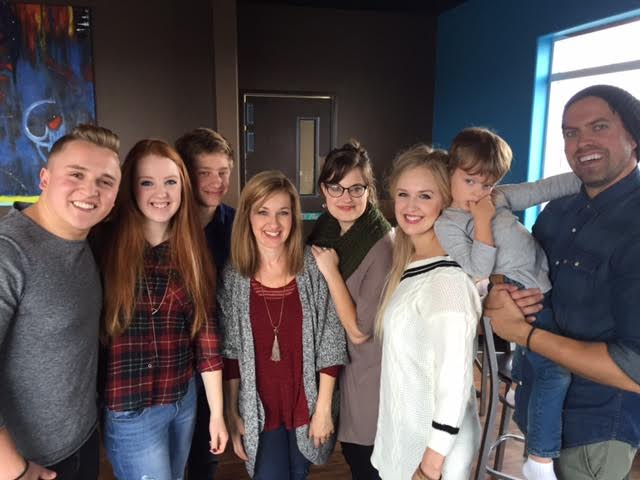 One thing I did that I really am thankful for is in the beginning, when people would ask me, “How can I help?” I would say, “You know what? Will you just take on this kid? Will you take on Josiah and just pray for him? You don’t need to pray for my family, you don’t need pray for Steve. Will you just be Josiah’s prayer person and just tackle that?”
One thing I did that I really am thankful for is in the beginning, when people would ask me, “How can I help?” I would say, “You know what? Will you just take on this kid? Will you take on Josiah and just pray for him? You don’t need to pray for my family, you don’t need pray for Steve. Will you just be Josiah’s prayer person and just tackle that?”
I did that for all of my kids with different people. And so that gave me a lot of peace to know that I had some really strong prayer people on guard for each one of my children. And they took that seriously, man. They weren’t all women—most of them are women—but they fought hard for my kids on their battlefield. And that was really good for me because I had to deal with the flesh and blood of it. I had to deal with the logistics and the hurt hearts. But other people who could just pray, that was really a comfort to me.
I found that there were certain books that helped me—and this is interesting—but helped me specifically at nighttime. Nighttime was really difficult for me both before Steve died and after. And so I bought the Jesus Calling edition that was morning and night.
And honestly when you’re going through grief, you really don’t have the capacity to read long—at least I didn’t. I tried to read A Grief Observed by C.S. Lewis, and I couldn’t do it until years after my battle. I needed small, digestible encouraging things. That’s what I needed.
And so I started really leaning on Jesus Calling during that time, one reading in the morning and one at night, and I was just amazed at how often it spoke directly into my pain and or spoke directly into my fear about the future or my worry for the day. I leaned hard on that. It is my go-to gift for people who are going through hard times, that particular morning and night edition, where they can just get little bits of hope and believe that they’re not alone and that Jesus sees them in that moment. It was a real gift to me during that time.
“I started really leaning on Jesus Calling during that time, one reading in the morning and one at night, and I was just amazed at how often it spoke directly into my pain and or spoke directly into my fear about the future or my worry for the day.” – Bo Stern
And then I also made sure that my kids knew that they could say anything to someone else. They needed to have someone else in their life. They could say anything to me, but they needed to have people they could talk to who they could say things that they didn’t wouldn’t want to say to me or Steve that were too hard for us to hear. And that was important that they had people to go to that they trusted and that we trusted would lead them back to God in it all. And then I just tried to be available to them, and honestly I did that imperfectly. But I tried to just be available and open. Steve wasn’t able to be, he was just not strong. He was losing so much of his just energy and ability to speak that he just couldn’t be there for them in the same way. He was always there. But I just try to have lots and lots of conversations, which I think is what parenting is. It’s one long conversation.
Steve Meets a New Family Member on His Way Home
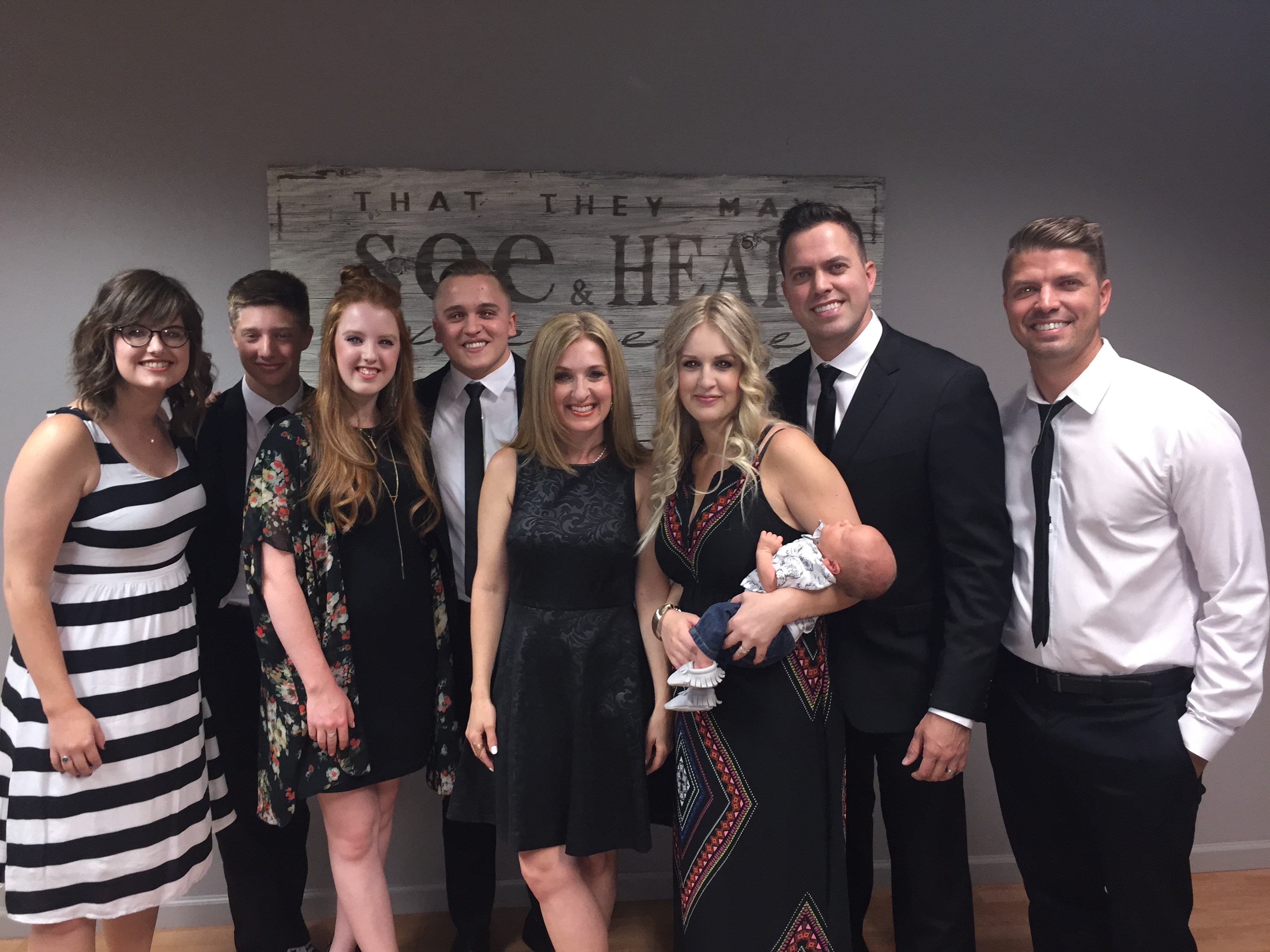 Thanksgiving of 2014, Steve had taken a real turn, and we went on hospice. And I can’t say enough about how beautiful hospice was for us. But the doctor had given him two months.
Thanksgiving of 2014, Steve had taken a real turn, and we went on hospice. And I can’t say enough about how beautiful hospice was for us. But the doctor had given him two months.
My oldest daughter, Whitney, announced at Thanksgiving that they were expecting their second baby.
And Steve looked at her and he asked, “When are you due?”
And she said, “July.”
And he said, “Well that’s my new goal, then.”
And we all kind of looked at each other like, “Oh . . .” We didn’t expect him to make it through Christmas.
And so on July 6, 2015, Whitney had our grandbaby Phineas Brave, and they raced from the hospital to get that baby into Steve’s arms. And Steve was beginning transition at that time, and we knew it. We propped the baby up, and Steve prayed and just wept over him and dedicated him to Jesus. And it was like a Simeon moment. It was like those two—little Finn, helpless, and Steve, helpless—kind of high-fived on their way through to their next destinations, and it was beautiful and wonderful.
As soon as Steve met Finn, he for sure began the process of going home. And the last week of his life, my pastor came over to see him and pray with him and as he did every week. And he said to Steve, “Steve, who’s waiting: is it you or is it heaven?”
And Steve said, “Well, Josiah,” who’s our youngest son, “Josiah has a driving test this weekend, and I don’t want him to feel pressured with me dying. And Tess,” who’s our third daughter, “is on a road trip, and it’s not kind to leave someone you love is gone.”
And so Tess got home. Josiah passed his test. One morning [Steve] woke up, and I got him out and got him in his wheelchair and did all the stuff we did to get him ready for the day. I could just tell he was in and out. And then he went into distress at about 11:00 a.m. that morning. We had a caregiver here, and she called me into the room and it just happened that all my kids were here at home.
I had been, for four years, saving his life—like, going into rescue mode. And I knew this was it. And it was so hard to hold that part back but I felt God just say, “Help him home.” So I just leaned in close to him in his wheelchair, and I started telling him all the things that he had meant to us and the way he had lived his life that was so beautiful and all he was he had accomplished. And I told him about 20 times, “You’re about to get the best meal of your life,” because he hadn’t eaten real food so in 20 months. And we talked to him about who he would see.
And then about 25 minutes later, he flew away home. And I fell at his feet in his wheelchair and just sobbed out my gratitude to Jesus for the gift of him in my life. And I felt that probably Steve was doing exactly the same thing at exactly the same time, just so grateful to Jesus. I can’t tell you how I asked a lot of, “Why, God?” in the process, but not in that moment. In that moment when Steve went home, there was no, “Why, God, was this so bad?” It was almost like, “Why, God, were so so good to me?” And so that was the process for him, and it was really difficult but really lovely.
When Holidays Hurt
I didn’t start writing a book. I just started journaling my way through our first Christmas. It was so hard, and I felt so disoriented. The holidays had always been a point of orientation for me. “This is when we all come back together. This is when all the things go well. This is what the house looks pretty.” And all of a sudden, I got into this holiday season where everything just felt a-kilter. Everything fell off base.
I had this little meltdown in Target one day. They started playing holiday music, and I’m there in the LEGO aisle just like having those little “I can’t do it” [moments], and I had to go home.
I sat down with my Bible. I looked at the Christmas story through really fresh eyes, and I realized this was not an easy story. This was not American perfection. This was hard. This was an unwed pregnancy. This was a tough situation. They’re traveling. They’re going to pay taxes there. I mean, there’s so many things about the Christmas story that are so relatable and so not worthy of a Target ad. I really started leaning into that.
So every day that Christmas season, I read the Christmas story in a different translation and a different gospel. Even the Christmas story that says, “The Word became flesh and dwelt among us.” What did that mean? What did that look like? And I started to try to pull out from that all the ways that I knew I still fit inside Christmas. My story still fits inside of this story. I’m not disqualified just because I cry when I get a Christmas tree. And so that was really helpful for me to start to lean in.
Things don’t have to be relentlessly happy or unbearably sad. They can be both. And letting those things dance together was a really important thing. And what was interesting to me about hearing from readers was that some of the saddest stories I heard weren’t very dramatic on the surface. They were more long years of disappointment: Christmas still without the spouse they hoped they’d have, or a Christmas still without a child they hoped to have, or Christmas still without enough money struggling to make ends meet and feeling like “My Christmas is never going to look like I thought.”
Again, I think Christmas is sort of a milepost in our year where we kind of come back together and say, “How we doing this year? What does life look like this year? Next year will be better,” or whatever. And for people dealing with with long stretches of disappointment, Christmas is a real bummer. It’s real hard.
So listening to stories and seeing people start to get this glimmer of, “What if even though I think I lack the resources I need emotionally or physically, what if even then I might be willing to give something out? I might be willing to release a little bit of my compassion, or my grace, or my money, or my gifts, or my food, and let someone who’s hurting more than I am into my life? What might happen then?”
That was really beautiful to watch: people who were in deep seasons of pain began to get a heart for other people in pain and start to reach out and start to see some joy come into their sorrow. Again, it’s not joy that replaces sorrow, but it is joy that stands alone end and does give you a respite in the middle of the kind of this unrelenting grief that happens at this time of year.
“It’s not joy that replaces sorrow, but it is joy that stands alone and does give you a respite in the middle of the kind of this unrelenting grief that happens at this time of year.” – Bo Stern
How to Hold Joy and Pain at Christmas
We’ve brought some lovely additions into our family. That doesn’t make us miss Steve more, but these are beautiful people that have come into our our group of relationship since then. And being able to see them as beautiful, it’s not that we traded Finn for Steve, but we’re so glad we have Finn. And it’s lovely to see that happen.
We just went through Thanksgiving, my family and I, and I would say it was our best Thanksgiving ever. It was just beautiful. It was amazing. We were with friends and family, and we were able to remember Steve with so much love and be so happy for him and be able to see our future fresh. And I think that’s one of the things I love to tell people who are in a battle is there is hope on the other side. Again, not that there will be life without pain, but that there will be beauty in your pain. And so it’s really been a lovely season.
“I think that’s one of the things I love to tell people who are in a battle is there is hope on the other side.“ – Bo Stern
We try to really make a big deal about [Steve’s] birthday. We have the grandboys send balloons up, and we have his favorite cake, which none of us like but we laugh so hard every time we eat it. It’s a weird like pudding cake that you get at the grocery store. It’s like four dollars. And he loved it, and we none of us like it. We just laugh and we’re like, “This is what he loved!” And so every birthday we really celebrate that and celebrate his life.
And then holidays, we just try to remember good, fun stories, even when the stories happened during his illness or were because of his illness. He had a certain call button that he used to get us that was the sound of a doorbell. And we all have sort of PTSD surrounding doorbell sounds now, and so we try to make it funny. We’re sure to say, “Wow, that was hard and. But we’re all still standing.” And I think we know how to love better than we knew before.
I tell people, ‘The only thing you can control is inhale, exhale. So make sure you’re inhaling the compassion and grace you need from God and from other people, and make sure you’re also exhaling out compassion for other people—compassion that doesn’t always circle around what you’ve experienced.” When someone tells you about something they’re going through, you don’t have to automatically bring that back to what you’ve been through. Just let them receive from you, receive grace, even if it’s just silence. But they’re receiving from you. And I think that’s all we can do is inhale, exhale, and everyone is at a different level of being able to do that.
“When someone tells you about something they’re going through, you don’t have to automatically bring that back to what you’ve been through. Just let them receive from you, receive grace, even if it’s just silence. “ – Bo Stern
I’m four years out, and I’m able to give out in in vastly different ways than I could give out two years ago or three years ago. And so I didn’t demand that of myself three years ago. I let myself sort of be fetal position and just write a check to the Benevolence Fund. But now I can give out emotionally, and I can give out in other ways. And knowing what you’re able to do and doing that is all God asks. I don’t think He asks us to be like each other. He just says, “Do what you can do now, and I’ll meet you with the resources you need to do the next right thing.”
God has already been to all the minutes that you will face, and He’s made provision there. You may not know it right now or see it right now, but you’ll see it when you get there. So I think in the holidays especially is a time where we have to be willing to live in the moment with the provision that God’s made for us, and trust Him with the minutes that will come.
“God has already been to all the minutes that you will face, and He’s made provision there. “ – Bo Stern
I can look back and see His fingerprints all over the landscape. I see where He showed up. I see where His care for me was so faithful and so true. And so I just want to try to encourage people that there is hope that you will get to the other side, and that He will walk you through it and to whatever it is that He has next, and He’s faithful in these hard times.
Narrator: You can find Bo’s book When Holidays Hurt wherever books are sold.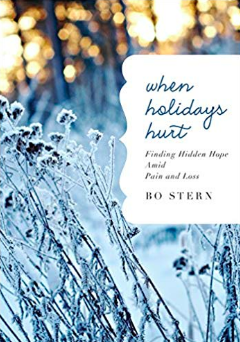
Stay tuned to hear our next guest, therapist Justine Froelker, after this message from our sponsor.
 Narrator: Hi, I’m Laura Neutzling, the host of the Jesus Calling Podcast. One of my favorite Christmas memories when I was growing up was the gift that I would get each year from my dad. I would smile, seeing that tiny box under the tree each year and couldn’t wait to open it. Removing the Christmas paper and opening that little coral box, I would always find a treasure, a piece of jewelry that was special, picked out by my dad for me from James Avery Artisan Jewelry. I cherish those pieces even today.
Narrator: Hi, I’m Laura Neutzling, the host of the Jesus Calling Podcast. One of my favorite Christmas memories when I was growing up was the gift that I would get each year from my dad. I would smile, seeing that tiny box under the tree each year and couldn’t wait to open it. Removing the Christmas paper and opening that little coral box, I would always find a treasure, a piece of jewelry that was special, picked out by my dad for me from James Avery Artisan Jewelry. I cherish those pieces even today.
Gifts from James Avery help tell your story, one that you and your loved ones will remember for years to come. Bring a smile to the face of those you love this Christmas with a special piece of jewelry from James Avery. This Christmas, that’s the kind of smile I’m looking forward to!
James Avery Artisan Jewelry can be found in their stores, in many Dillard’s locations, and online at jamesavery.com.
Narrator: Our next guest is therapist and writer Justine Froelker. As Justine has grown closer to God and studied with shame and vulnerability researcher Dr. Brené Brown, she has learned how to share her painful journey so she can help others. After a happy, healthy childhood, 11-year-old Justine began to feel crushing, chronic pain. After a series of misdiagnoses, multiple surgeries, and six months in a full body cast, Justine felt like no one relate to her and the immense pain she had gone through. She once again found this chasm between her and others as she struggled with infertility, all the while witnessing her friends’ growing families. In an unlikely encounter with God on Christmas Eve, she realized He had been with her during every painful step of her journey, and He had great plans for her, though they might look different than Justine’s own plan for her life.
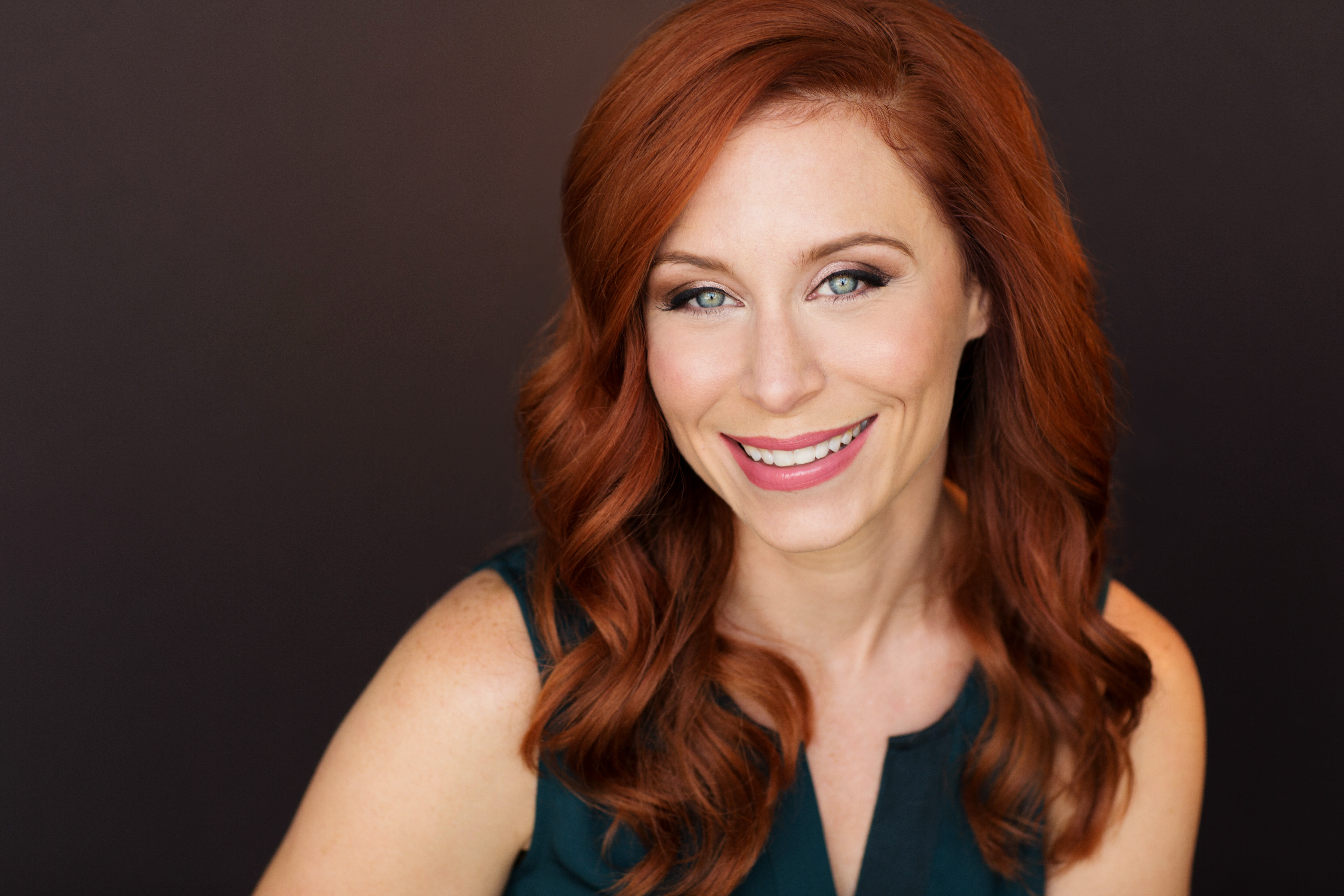 Justine Froelker: I am Justine Froelker. I grew up in a small town in Iowa with no stoplight and kindergarten through 12th grade in one building. I milked cows as a job in high school, which most people can never believe, but I did. It paid really well. And I grew up in a family with one sister, and we grew up with faith, not religion. And it definitely wasn’t Jesus, despite going through some really, really difficult times.
Justine Froelker: I am Justine Froelker. I grew up in a small town in Iowa with no stoplight and kindergarten through 12th grade in one building. I milked cows as a job in high school, which most people can never believe, but I did. It paid really well. And I grew up in a family with one sister, and we grew up with faith, not religion. And it definitely wasn’t Jesus, despite going through some really, really difficult times.
Growing Up with Spinal Spondylosis
Growing up, I always wanted to be a dancer. I was going to go to the University of Iowa to study dance. And then around age 11, I started to have a little bit of pain—actually, quite a bit of pain. We started going to doctors, and no one could really figure out what was going on. I was still dancing because no one told me to stop dancing.
Around 11 is when I really could not even hardly walk, and so we went to Mayo Clinic. And after two very painful procedures, one being that they put cameras in my hip joints while I was awake, they put us in a small little exam room and said the words “conversion hysteria,” and said that I was going to go have to see another doctor. They escorted my dad and I out of the room and put my mom back in the exam room and said, “You’re making her dance. Her brain is making up the pain psychosomatically. There’s nothing wrong. She needs to go see a psychologist.”
And my mom came out of the room and I was like, “What’s conversion hysteria?”
And she was, “They think you’re crazy. We’re going to go see a psychologist,” basically.
That was a really defining moment for me. That was a moment I started the story in my head that, “I’m alone, and no one can help me.” And I mean God . . . God wasn’t even on the table because we didn’t have that kind of faith.
And then I had a misdiagnosis that was a tumor. That was quickly like ruled out. And then my next misdiagnosis was fibromyalgia.
And so one of those next whispers from God, even though I would never have said that or my family never would have said that back then, was a specialist was coming through our nearest city. It took her four hours to go through all of my charts, and she walked out into the waiting room and said, “Have you ever heard of spondylosis?” And none of my family had not heard those terms. And she goes, “They’re all over your charts. You have a broken back. There’s two cracks on L5. You need surgery immediately. It’s the worst slippage.”
The vertebra was a grade-four slippage, and she held up an X-ray and she said, “This is a year-old X-ray from a chiropractor. It’s right there.”
And I had an answer.
So two weeks later, I had my first back surgery, and I was in the hospital for eight days. Then I spent six months in a body cast. And that was August 25th, 1994. So I just had my 24-year anniversary, before my freshman year of high school.
Three years after my first back surgery, I tried to go back to dance, and I tried to specifically go back out for track, and I couldn’t run. I was like, “Something it doesn’t feel right.” So that was enough for them to take an MRI versus a versus an X-ray. And that’s when they found that I was [one of] the 10 percent [where] the surgery didn’t take.
So they repeated the exact same surgery. They put me in a body brace this time, so it wasn’t a 30-pound plaster cast, but it was still from my chin to my knees, and I still couldn’t bend. I was either lying down flat or standing up. And this was the summer before my senior year of high school. It was a little bit it was an easier recovery because it wasn’t a cast, but I also got pneumonia, so they had to drain my lung. And so it was just kind of one thing after another.
And again, that kind of story of, “You’re all alone. No one can help you.” And again, God wasn’t on the table yet.
Following that, I said, “Peace out. I’m going to college in Missouri.” I was the only student from my class in a class of 50 kids that went out of state for college. And I just I didn’t want to be the girl in the body cast anymore. I knew I wasn’t supposed to be a farmer’s wife. And so I left.
A Long, Painful Road Through Infertility
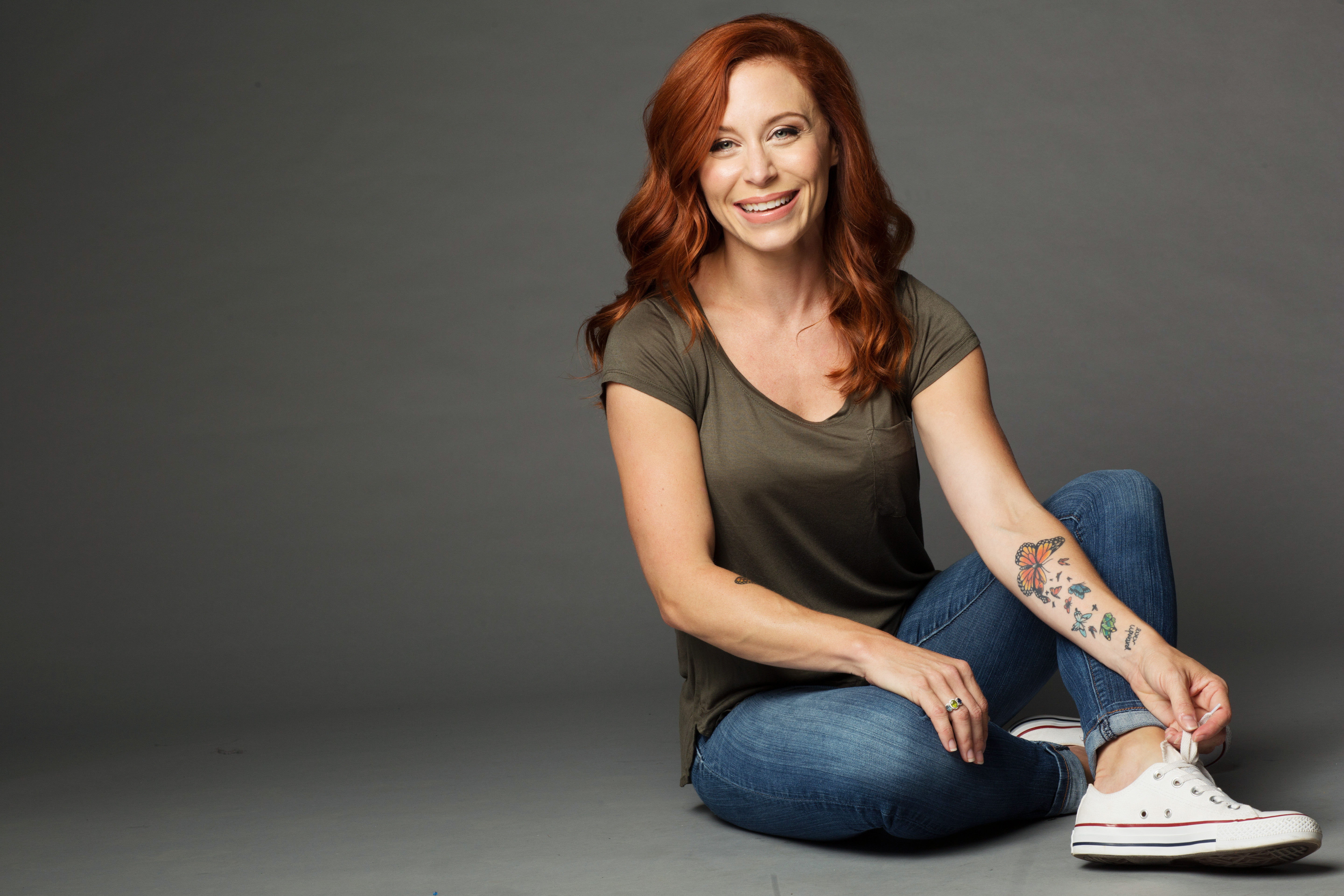 It was after college that actually met my husband, Chad. And I had gone all those years telling myself that I never wanted to be a mother. What I know now is that’s denial. I didn’t think it was possible. I knew it wasn’t going to be possible, let alone the limitations of my body.
It was after college that actually met my husband, Chad. And I had gone all those years telling myself that I never wanted to be a mother. What I know now is that’s denial. I didn’t think it was possible. I knew it wasn’t going to be possible, let alone the limitations of my body.
I told myself that we weren’t going to have kids. We got married believing that we were going to be a child-free couple. And then it was God—I suppose you can call it a “biological clock” or meeting the person that you’re and spend your life with—it’s God. We knew we wanted to try, and so we explored gestational surrogacy.
So we had to go through that. I had to go through all the medications to get my eggs to make embryos with Chad, and then we found a surrogate online. And then we embark on an infertility journey.
I put my body through synthetic hormonal awfulness, and we get two embryos our first round. [Our surrogate] doesn’t get pregnant. Nothing happens at all. And we had only planned financially and emotionally for one round, but then you lose two babies. And it was supposed to work, because it had to work. It was supposed to work, because we had all these people praying for us and positive light and energy and all of that stuff. It was supposed to work, because we had the best doctor. It was supposed to work, because we were young. It was supposed to work, because our surrogate was great and healthy, and it didn’t. Not even one positive pregnancy test. We had in grainy black-and-white picture of two, eight-cell embryos.
I had a friend look at me who had been bugging me to go to a certain church for a long time, but there’s no way I was going at this point because I was pretty mad. And she said, “Are you going to be okay in 20 years if you guys did something that only has a 50-percent chance of working one time?” And honestly, it’s less than 50 percent. Infertility has a 30 percent success rate of a baby in your arms. Not enough people talk about that statistic. The odds aren’t in your favor.
We took out the loan the next day. We were able to take out a loan the next day because IVF is expensive, because you can’t live your life without wonder, the wonder of what those two babies would have been, and then the wonder of like, “What if we had tried one more time?”
And so we did. We took the loan out. Lots of couples won’t ever get to have take that loan out, so that was a blessing right then and there. We tried one more time, and my numbers were worse. We only got one embryo, and so that’s why I always talk about my three [babies]. And again, [our surrogate] didn’t get pregnant.
And so with broken hearts and really angry at the God that I now for sure knew would not help me, even though I had tried to seek Him for so long before that, we ended our journey without kids. And also the money was gone. Not enough people talk about that part.
So we started to do this work of, “What’s it look like to lead a child-full life?” I know that one of my values is motherhood, and so I work and I fight for and I create and I receive ways to mother.
We never felt called to adoption. And I love having that conversation, especially in the Christian community because I think a lot of people think that adoption is the fix to infertility. And I think Christians definitely are called to adoption. It doesn’t mean every Christian is called to adoption. And so we are very involved in lots of kids’ lives, but we were not going to sign up for another journey that involved a lot of heartbreak and way more money that we didn’t have.
Then we were in the desert, like, a real dark desert. Because you’re now in debt. You’re now even more mad at God. And now you have to figure out what life looks like when it wasn’t supposed to be this way. That’s not what we hoped dreamed and planned or even paid for.
“You have to figure out what life looks like when it wasn’t supposed to be this way.” – Justine Froelker
I’m pretty mad at God. And I wrestled for a really long time, and I think it was persistent friends who just kind of kept loving me well where I was, not shoving it down my throat because that those only made it worse. It would bring up that unfair God. I’m like, “What loving God are you talking about? What loving God would put me through what I have been through?”
And that’s been one of my lessons: always look for the loving Father. Always look for the loving Father. He is there.
Finding the Loving Father
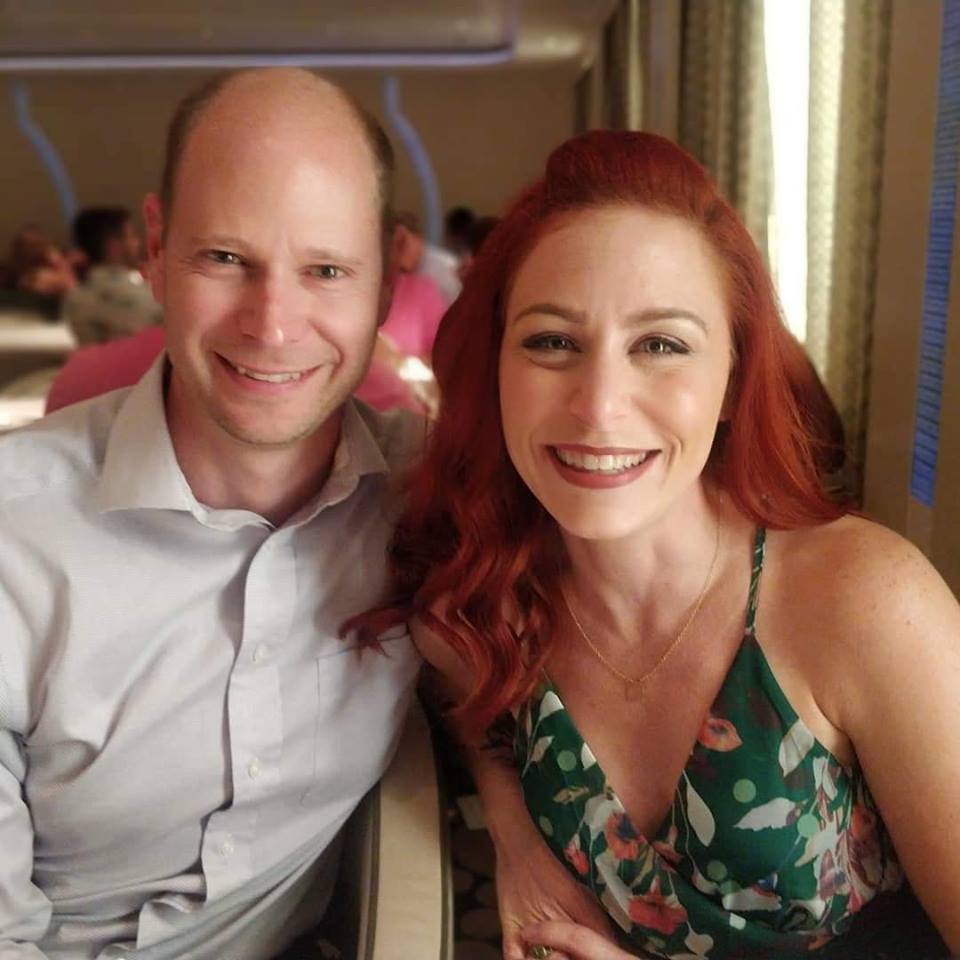 We stumbled into our current church on Christmas Eve because my friend would not let it go. She would just go, “I think you’ll like it. Just go. It’s big.”
We stumbled into our current church on Christmas Eve because my friend would not let it go. She would just go, “I think you’ll like it. Just go. It’s big.”
I was struggling with that part too. For couples who are struggling to have babies, and especially those that end the journey without children, church can be tough—especially smaller churches that still bring kids up to the front or child dedication days where couples like us are never mentioned. It’s just tough. Or where even your pastor asks the dreaded question, like, “Why don’t you just adopt? That should fix it.”
“For couples who are struggling to have babies, and especially those that end the journey without children, church can be tough.” – Justine Froelker
And so I don’t know, God got me there. And I remember walking into this huge church. And Chad was like, “This does not even look like a church,” I mean especially how he grew up. “I mean, they serve coffee, and there’s like a band. It’s on the radio.”
And the volunteer saw our faces and she’s like, “Are you new here?” She could totally see it right away.
And we were like, “Yeah.”
And she goes, “Well, we are in the overflow already. So just for future reference, Christmas and Easter, you’ve got to get here about 45 minutes early.”
And I remember I looked at Chad with tears in my eyes, and he knew I was so mad right away.
I remember looking up and thinking, “God, seriously? You got me here. And I have to go watch on a screen?”
And then the service started, and the music played, and it was exactly what my broken soul needed. He showed up. And it was a wrestle because I had to . . . I had to wrestle with the fact that long ago, I had chosen the story of, “No one will help me. I’m all alone. There can’t possibly be a God,” when He was there the whole time. And it’s those things that He used to lead me to Him.
God Wired Us for Vulnerability and Connection
When I teach, I always say, “God gifted me this story to teach the world this work.”
I’m a certified Daring Way facilitator. I’ve trained with Dr. Brené Brown, who’s a shame and vulnerability researcher. She teaches a lot on empathy versus sympathy. My story’s a perfect example of that. Sympathy: “I feel for you.” It’s pity. “Oh, you poor thing. I just can’t imagine.” Versus empathy: “I feel with you. Oh my gosh, that’s awful.” We’re trained and socialized to give sympathy and even to think that we want sympathy. “I’m so sorry.” When someone dies what’s the first thing out of everyone’s mouth? “I’m so sorry.”
First question I get asked everywhere I go: “How many kids you have?”
“We can’t have kids. We tried really hard. We live a child-full life.”
And so we work really hard on practice and parenting in other ways. And I oftentimes get the response of sympathy. “Oh, you poor thing. I just can’t imagine.” Or I get the response of, “Why don’t you just adopt or just try another round?” Both of these responses come from love. They do. They’re not malicious. People are human. They are flawed. They come from curiosity and love.
And I’m an advocate. So I will teach, and I will say, “What would it be like for you to say, “That’s just really hard,’ or, ‘That sucks. Can I sit with you?’” So much of what we think people need is for us to fix their pain. And then we both feel crappy and alone when we do that.
“So much of what we think people need is for us to fix their pain. And then we both feel crappy and alone when we do that.” – Justine Froelker
So what if, instead, you practice courage and sat beside me with me with my pain? Not in it—we don’t all need to sit in our pain because we’re both in it, and how are we going to crawl out of it?—but just sit beside me. Show up. You don’t need to say anything because nothing you say can fix it. The important part of that conversation is not just like the script of, “Oh my gosh, that’s hard,” or “That sucks,” or whatever else. The hardest part about that conversation is the vulnerability part. But that’s what’s required of connection.
And at the end of the day, we’re all yearning for heaven because He made us that way. We are yearning for Him. We’re yearning for connection. He wired us to connect, but that requires vulnerability, and that takes courage.
“At the end of the day, we’re all yearning. . . . yearning for Him. We’re yearning for connection. He wired us to connect, but that requires vulnerability, and that takes courage.” – Justine Froelker
Getting Through the “Seared Dates”
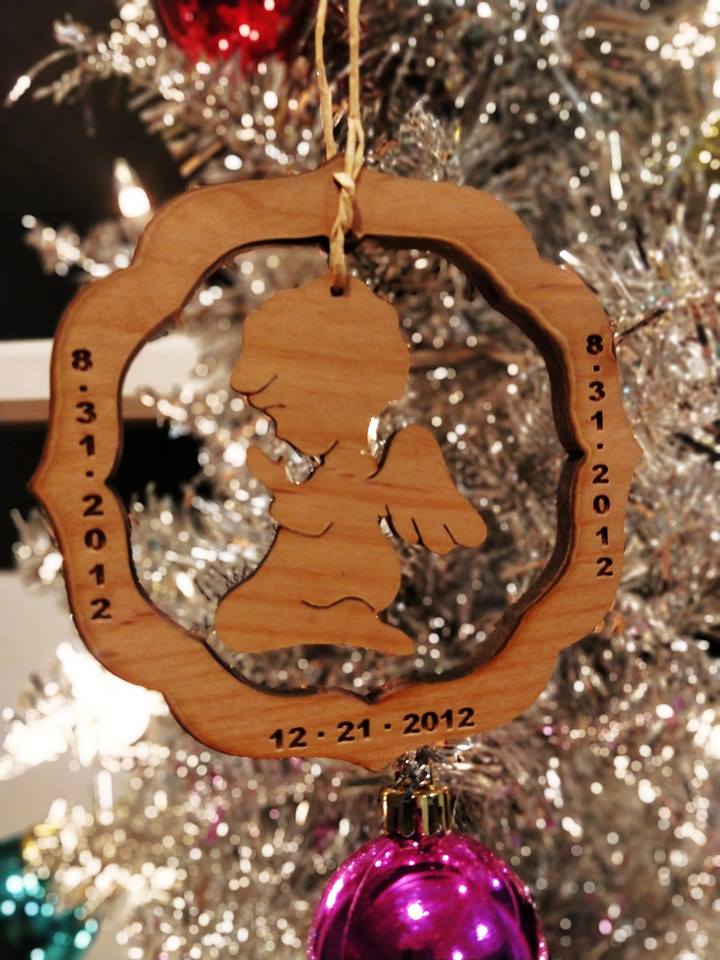 One of the toughest parts of the infertility and loss journey that I think a lot of people they forget or they don’t consider the weight of them are what I call “Seared Dates.” It’s the due dates that they were supposed to be here, that we will remember them always. It is the holidays. August can be brutal. It’s a whole month of back-to-school pictures on social media. A whole month.
One of the toughest parts of the infertility and loss journey that I think a lot of people they forget or they don’t consider the weight of them are what I call “Seared Dates.” It’s the due dates that they were supposed to be here, that we will remember them always. It is the holidays. August can be brutal. It’s a whole month of back-to-school pictures on social media. A whole month.
Then you’ve got the holidays. I have wrestled with Christmas, especially. Christmas is always tougher than the Easter holiday, and even Thanksgiving. And it’s this longing of, “What would it have been like to have them here at the table? What would they like? Oh my gosh. They’d be 6 this year, like, totally getting the Santa thing.” And you’re praying that the dream’s not crushed at school too soon, but it’s the wonder and the yearning of it.
I think so many people think, “We can’t say anything. We don’t mention couples like you in church.” Even our friends and family don’t say anything because they’re afraid they’ll make us sad. We’re already sad. And there’s so much power in you seeing us. I’ll never ever forget it was it was Mother’s Day this year for the first time, my pastor mentioned couples who were struggling to conceive. I emailed them and I thanked them.
Show up. Be willing to say the hard parts, which is just like, “I’m just thinking about you. I know that this time of year can be tough.” That’s it. Show up. You don’t need to fix it, you don’t need to make it better.
It’s also my job to ask for what I want and need, and to set boundaries. Some of our best friends have three boys. They know I want to be invited to everything. And they also know that there will be days that I say, “It’s too hard, and I can’t come.” And then it’s also my job to create those traditions. That’s been, though, years of working through it. There were two years there where I did not put up anything, Christmas wise. I was struggling.
And so it was hard. I had to give myself permission to yearn and long and create these new things are still such a gift, and to not apologize for them, and to receive what other people were trying to gift me in their traditions. They’re not mutually exclusive. They’re both.
Jesus Calling
My mother-in-law got this for me when I was exploring, my first Jesus Calling. And I didn’t even write in it. It’s been read through at least three times, probably four times every day, obviously. And it’s funny. I don’t mark up my Jesus Calling. I will mark up my other books [by Sarah Young]. I don’t markup this one. I guess that’s because it was with me from the beginning, and it will be on my nightstand till the end, most likely. I gift it to everybody.
November 29th:
Let Me infuse My Peace into your innermost being. As you sit quietly in the Light of My Presence, you can sense Peace growing within you. This is not something that you accomplish through self-discipline and willpower; it is opening yourself to receive My blessing.
In this age of independence, people find it hard to acknowledge their neediness. However, I have taken you along a path that has highlighted your need for Me, placing you in situations where your strengths were irrelevant and your weaknesses were glaringly evident. Through the aridity of those desert marches, I have drawn you closer and closer to Myself. You have discovered flowers of Pace blossoming in the most desolate places. You have learned to thank Me for hard times and difficult journeys, trusting that through them I accomplish My best work. You have realized that needing Me is the key to knowing Me intimately, which is the gift above all gifts.
It’s been interesting, the more I’ve been sharing my faith walk publicly. I thought I would be talking to new believers or people who had not yet believed. And I’m actually reaching so many believers who are stuck and who have lost their faith. I think it’s because I’m giving them permission to wrestle and struggle and to get curious and wonder in this awe again. And that that’s huge in the Christmas season, for sure. This wonder of this God that entered the story in this most vulnerable way for us.
[Sarah] helps us get curious about who He was by how He writes through her. And so I think that’s what helped me along the way.
TED Talk with Justine Froelker
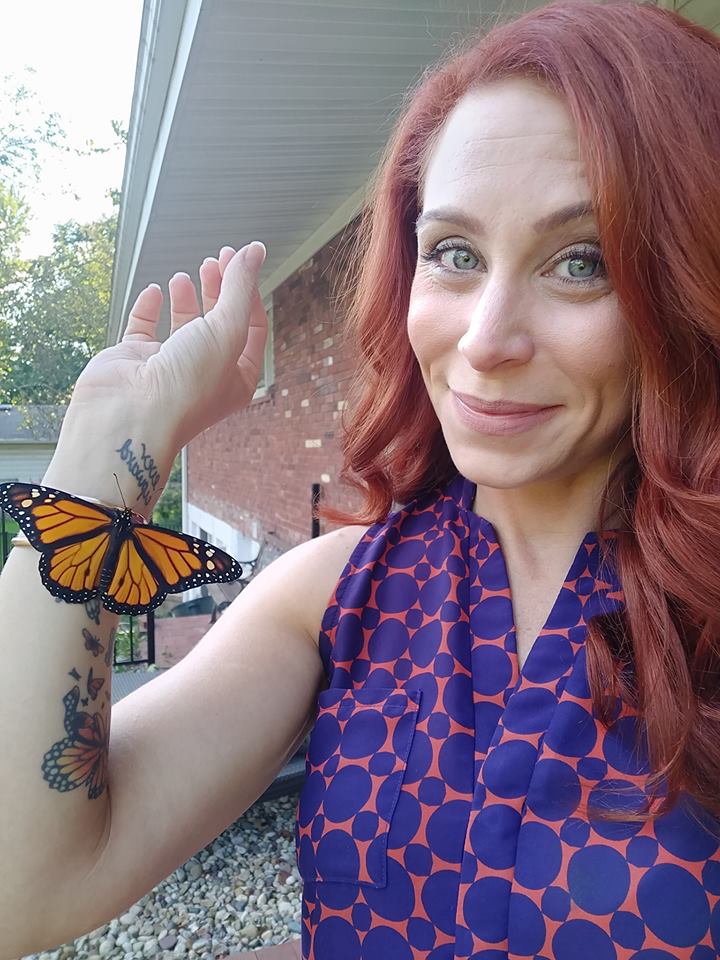 When I was prepping for my first TED talk, I was really struggling with delivering a joke in it. And my TED coach, [Cassandra] was so frustrated with me. She was like, “I can still feel bitterness and pain. What’s stopping you?”
When I was prepping for my first TED talk, I was really struggling with delivering a joke in it. And my TED coach, [Cassandra] was so frustrated with me. She was like, “I can still feel bitterness and pain. What’s stopping you?”
And it came back to that “This isn’t fair. Where is the loving Father?” that unfairness, the victim mindset, the hard parts.
And so she was like, “There is the block. You’re holding onto that victim mindset. I need you to take a whole day off from your TED talk.”
And I said, “Absolutely not. Like we’re two weeks out of a TED talk.” And my coach required 200 rehearsals, and so I said, “I can’t take a day off.”
And she said, “You’re going to take a day off, and I want you to listen to your worship music. I want you to walk the dogs. You are not to rehearse this TED talk.”
I walk the dogs and listen to my worship music, and Crowder’s “How He Loves Us” comes on. And I don’t hear God audibly. I oftentimes have that argument with Him. “I would like a very crystal clear text message from you.” But He said so clearly, and this is usually when He smacks me upside the head: “Don’t ever question my fairness.” And that it was a defining moment in my faith walk since finding Him or receiving Him is what it was. “Don’t ever question my fairness.”
[embedded content]
My story is still tough. It’s trauma, and it’s loss and grief that will live in our bodies forever. And people call it hard forever. And on the hard days and the good days, the enemy will grab it.
I’ve stopped calling my story hard. I have a big story. Because when we hold on to the hard parts of our story, I think the enemy and shame will grab them and run. And we don’t honor our big stories when we let that happen. We don’t honor the path that God is laying out for us to glorify Him and share Him and His Son with people.
Narrator: To learn more about Justine and the resources she offers, visit justinefroelker.com.
Narrator: Next time on the Jesus Calling Podcast, we talk with Will Graham. Will is the grandson of the legendary minister Billy Graham, and the vice president of the Billy Graham Evangelistic Association. Though he grew up experiencing the legacy of his grandfather, Will was given freedom to follow any path he chose. He tells us why he chose to work in his family’s ministry.
Will Graham: People often ask me, “So Will, when did you decide to get into the family business? When were you going to fall into your granddaddy and your dad’s steps?”
Well, first and foremost, I tell people it’s not a business. When it comes to ministries, they’re not ours. They’re God’s. God gives people ministries.
When I look back at my life, here’s not one day I can just put my finger on and say, “Here it is.” But I see breadcrumbs. I see where God was leading me toward this.


